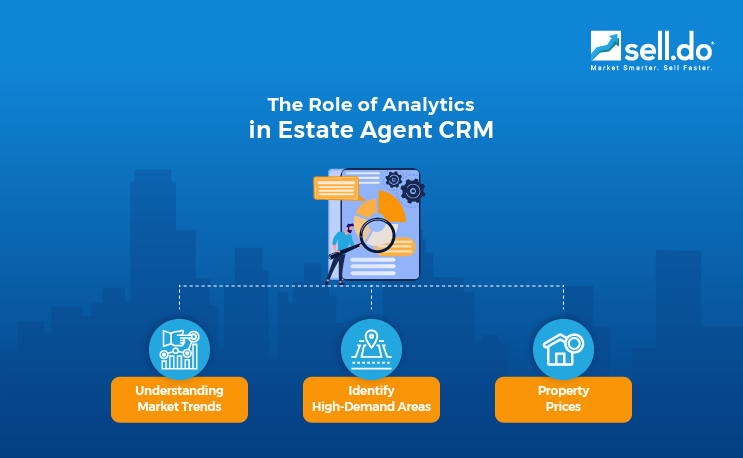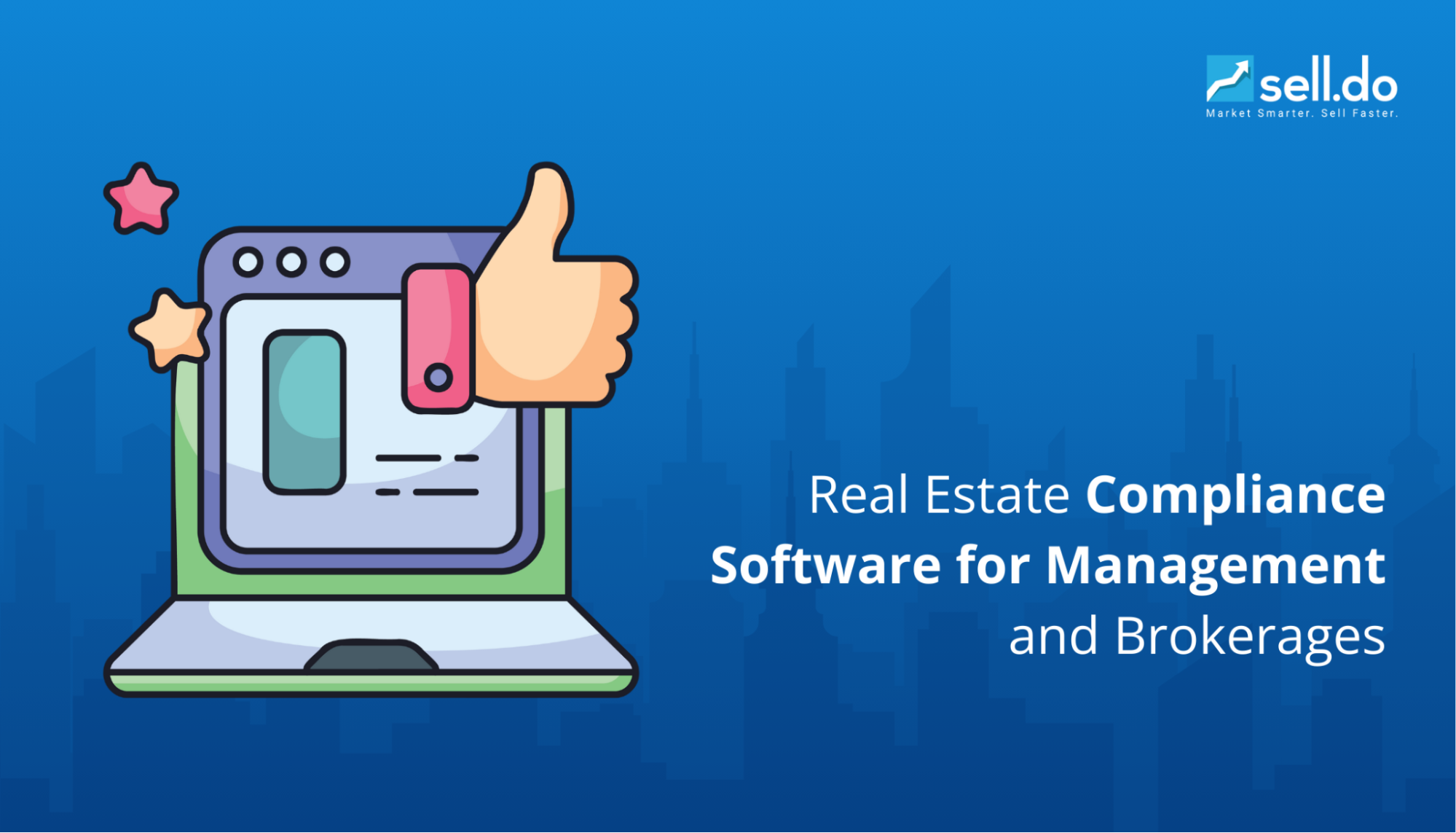In today's competitive real estate market, staying a step ahead of the curve requires more than just traditional methods. The integration of technology, particularly Customer Relationship Management (CRM) software, has revolutionized how estate agents operate. This blog will explore the role of real estate CRM analytics, emphasizing how analytics can drive informed decisions, enhance customer relationships, streamline operations, and ultimately boost sales.
In this blog, we will help guide estate agents in understanding the immense potential of CRM analytics. By leveraging data-driven insights, agents can optimize their strategies, improve client satisfaction, and make data-driven decisions in real estate to achieve greater efficiency.
What is CRM Software?
Customer Relationship Management Software (CRM) is a tool created to help businesses manage interactions with current and potential customers. It centralizes customer data, automates marketing tasks, tracks communications, and provides valuable insights through analytics. CRM software is essential for establishments looking to enhance their customer relationships and run their operations efficiently.
What are Real Estate Agent CRM Systems?
Real estate agent CRM systems are specialized CRM tools tailored for the real estate industry. They help agents manage property listings, track client interactions, schedule appointments, and automate marketing campaigns. By integrating these functions into one platform, real estate CRM software enables agents to work more efficiently and provide better service to their clients.
The Role of Analytics in Estate Agent CRM

-
Understanding Market Trends:
Analytics within CRM systems provide estate agents with a clear understanding of market trends. By analyzing data on property prices, buyer preferences, and market demand, agents can make informed decisions about where to focus their efforts. This insight helps identify high-demand areas, predict property price movements, and tailor marketing strategies to current trends.
-
Identify High-Demand Areas:
Using CRM analytics, agents can pinpoint high-demand areas by examining buyer inquiries, property views, and sales data. This allows agents to concentrate their marketing efforts on regions with the highest potential for sales, increasing their chances of success.
-
Property Prices:
CRM systems can display property prices in high-demand areas compared to low or average-demand regions. This comparison helps agents and clients understand the market dynamics and make informed decisions. Visual aids like statistics or demo animated pictures can enhance this understanding.
Enhancing Customer Relationships
-
Creating Email Campaigns:
CRM analytics enable agents to create targeted email campaigns based on client preferences and behavior. By segmenting clients and personalizing content, agents can increase engagement and conversion rates.
-
Improved Customer Service:
A CRM system helps agents track client interactions, preferences, and feedback, enabling them to provide personalized and timely responses. This level of service builds trust and loyalty among clients.
-
Engaging with Potential Buyers:
CRM systems allow agents to engage with potential buyers through automated messages, follow-ups, and personalized content. This proactive approach keeps clients interested and increases the likelihood of closing deals.
Streamlining Operations
-
Optimizing Lead Management:
CRM systems help agents manage leads efficiently by identifying and categorizing them based on their potential with the help of lead performance tracking. This ensures that agents focus their efforts on the most promising leads, improving conversion rates.
-
Identifying and Categorizing Leads:
Using CRM analytics, agents can categorize leads based on various criteria, such as buying intent, budget, and property preferences. This categorization helps agents prioritize their efforts and tailor their approach to each lead.
Insights and Feedback
-
Analyzing Marketing and Sales Performance:
CRM analytics provides detailed reports on marketing and sales performance. Agents can track the effectiveness of their campaigns, recognize areas for improvement, and adjust their strategies accordingly.
-
Tracking Website Activity and User Behavior:
CRM systems track website activity and user behaviour, offering insights into what clients are looking for and how they interact with the site. This information helps agents optimize their website and marketing efforts.
-
Performance Monitoring:
Regular performance monitoring through CRM analytics allows agents to assess their progress, set realistic goals, and ensure they are on track to meet their targets.
-
Predicting Cash Flow and Sales:
CRM systems can analyze past data and market trends to help agents predict future cash flow and sales, enabling better financial planning and decision-making.
Campaign Creation:
-
Crafting and Managing Tailored Marketing Campaigns:
CRM systems enable agents to craft and manage tailored marketing campaigns that align with their target audience. By leveraging analytics, agents can create campaigns that address specific client needs and preferences. It is called campaign performance optimization.
Software for Automated Real Estate Marketing
CRM (Customer Relationship Management) Software – Sell.Do
CRM software like Sell.Do are essential tools for managing customer relationships and interactions. These platforms automate marketing tasks across various channels, including email, social media, and SMS. They track customer interactions, personalize communications, facilitate quick responses, and enhance customer engagement. They also have their analytic reports and dashboards called Sell.Do CRM analytic reports and CRM dashboards.
Benefits of Real Estate Marketing Automation
-
Improved Process Speed:
Automation speeds up processes, allowing agents to handle more tasks in less time. This efficiency leads to quicker responses and faster sales cycles.
-
Avoiding Mistakes:
Automated systems decrease the risk of human error and to ensure that the data is accurately recorded, and tasks are consistently performed.
-
Efficient Management of Paperwork:
CRM systems streamline paperwork management by digitizing documents and automating routine tasks. This reduces agents' administrative burden and frees up time for client interactions.
-
Generating More Leads:
Automated marketing campaigns and lead management tools help agents generate more leads by targeting the right audience with the right message at the right time.
-
Automated Actions:
CRM systems automate repetitive tasks, like sending follow-up emails and reminders, allowing agents to focus on more strategic activities.
Conclusion:
Unlocking Insights with estate agent CRM systems can revolutionize agents' operations. By understanding market trends, enhancing customer relationships, streamlining operations, and leveraging data-driven insights, agents can drive sales and achieve greater efficiency. The power of analytics is undeniable, and estate agents who harness this potential will be well-positioned to succeed in the cut-throat real estate market.
It’s time to boost Your ROI with Real Estate CRM Analytics with Sell.Do CRM for your business needs and explore how it can transform your operations in real estate.







Leave a comment
Comments (0)
Be the first one to comment.